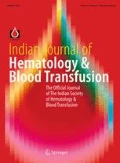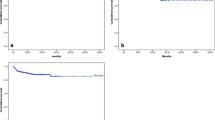Abstract
Imatinib is a tyrosine kinase inhibitor and is considered the first line of non stem cell transplantation treatment for patients diagnosed with CML. We evaluated the response rates and adverse reactions to Imatinib in our patients and tried to identify factors which affected the response to Imatinib. Eighty-four patients were diagnosed on the basis of clinical and haematological variables with confirmation by FISH, detecting Philadelphia chromosome or bcr-abl translocation and were then started on oral capsule Imatinib. A complete haematological response was seen in 78.04% patients, while complete cytogenetic response (CCR) was seen in 12.2% of patients and major cytogenetic response (MCR) was seen in 64.63% of patients. It was found that that a greater total leukocyte count (TLC) on presentation had a negative correlation with cytogenetic response. Cytopenias were seen in 36 patients (43.82%). 34.9% of patients having CCR/MCR required dose reduction while 73.6% of patients not achieving CCR/MCR required dose reduction. This was a significant difference, confirmed on statistical analysis (P < 0.05; P = 0.019), establishing the negative prognostic value of dose reduction due to cytopenias.

Similar content being viewed by others
References
O Brien SG, Guilhot F, Larson RA et al (2003) Imatinib compared with interferon and low dose cytarabine for newly diagnosed chronic phase chronic myeloid leukemia. NEJM 348:994
Cervantes F, Hernandez-Boluda JC, Steegman JL et al (2003) Imatinib mesylate therapy of chronic phase chronic myeloid leukemia resistant or intolerant to interferon: results and prognostic factors for response and progression free survival in 150 patients. Haematologica 88:1117–1122
Kantarjian H, Sawyers C, Hochhaus A et al (2002) Hematologic and cytogenetic responses to imatinib mesylate in chronic myelogenous leukemia. NEJM 346:645
Marin D, Marktel S, Bua M et al (2003) Prognostic factors for patients with chronic myeloid leukemia in chronic phase treated with imatinib mesylate after failure of interferon alfa. Leukemia 17:1448–1453
de Lemos JAR, de Oliveira CM, Scerni ACC et al (2005) Differential Molecular Responses of the transcripts B2A2 and B3A2 to imatinib mesylate in chronic myeloid leukemia. Genet Mol Res 4(4):803–811
Arora B, Kumar L, Kumari M et al (2005) Therapy with imatinib mesylate for chronic myeloid leukemia. Ind J Med Pediatric Oncol 26(2):5–16
Deshmukh C, Saikia T, Bakshi A et al (2005) Imatinib mesylate in chronic myeloid leukemia: a prospective, single arm, non randomized study. JAPI 53:291–295
Usman M, Syed NN, Kakepoto GN et al (2007) Chronic phase chronic myeloid leukemia: response of imatinab mesylate and significance of sokal score, age and duration in predicting the haematological and cytogenetic response. J Assoc Physician India 55:103–107
Author information
Authors and Affiliations
Corresponding author
Rights and permissions
About this article
Cite this article
Tripathi, A.K., Kumar, A. & Ramaswamy, A. Total Leukocyte Counts and the Requirement of Dose Reduction due to Cytopenias as Prognostic Indicators Affecting Response to Imatinib in Chronic Myeloid Leukemia. Indian J Hematol Blood Transfus 27, 7–13 (2011). https://doi.org/10.1007/s12288-010-0048-9
Received:
Accepted:
Published:
Issue Date:
DOI: https://doi.org/10.1007/s12288-010-0048-9



